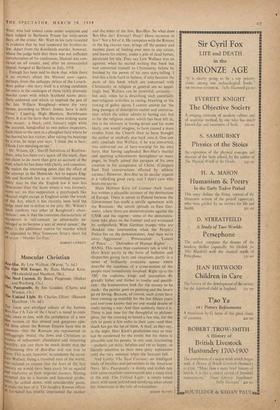Muscular Christian
The Unkind Light. By Charles Elliott. (Hamish Hamilton, I 3s. 6d.)
THE latest and abridged edition of the famous CI-Hier CA Tale of the Christ') is timed to coin- more or less, with the completion of a new "loi version of this absurd and gorgeous epic. All films about the Roman Empire have this in conimon---that the Romans are represented as Unflaggingly brutal, the Jews and Christians as olodels of refinement, cleanliness and simpering humility; nor can there be much doubt that the forthcoming film of Ben-Hur will run true to form. This is not, however, to condemn the novel. Lew Wallace, being a travelled man of the world, Was inclined to assume that the Jews of the first century AD would have been every bit as squalid `tod vindictive as their imperial _masters. Having 4ccepte1j this as a human and historical proba- bilitY, he settled down, with considerable gusto, to make the best of it. The haughty Roman officer 01 his • novel has cruelly imprisoned the mother and the sister of the Jew, Ben-Hur. So what does Ben-Hur do'? Entreat? Pray'? Have recourse to law'? Not a bit of it. He competes with the Roman in the big chariot race, brings off the neatest and nastiest piece of fouling ever seen in any circus, and leaves his enemy, under a pile of dead horses, paralysed for life. They say Lew Wallace was an agnostic when he started writing this book but had converted himself' to Christianity before he finished by the power of his own story-telling. I find this a little hard to believe, if only because the parts of this book which are concerned with Christianity or religion in general are so appal- lingly bad. Wallace can be powerful, certainly— but only when he is describing such essentially non-religious activities as racing, brawling or the rowing of galley slaves. I cannot answer for 'the long passages of descriptive matter and conversa- tion' which the editor admits to having cut; but as for the religious matter which has been left in, this is the ultimate in boring drivel and far more likely, one would imagine, to have caused -a mass exodus from the Church than to have brought the author or anybody else bapk into it. One can only conclude that Wallace, if he was converted, was converted out of hero-worship for his own hero; that having applauded Ben-Hur's martial and sporting achievements throughout so many pages, he finally joined this paragon of his own creation in his acceptance of Christ. (Compare East End conversations effected by athletic curates.) However, Ben-Hur in its secular aspects is a rollicking good yarn, and I don't care who hears me say so.
Hans Hellmut Kirst (of Gunner Asch fame) has written a plausible account of the destruction of Europe. There is unrest in Poland because the Government has made a servile agreement with the Russians : the unrest spreads to East Ger- many, where there are demonstrations against the USSR and the regime : some of the demonstra- tions take place on the frontier and are witnessed by synipathetic West German troops,, who are shocked into intervention when the People's Police fire on the demonstrators. And then we're
away. 'Aggression' . . . 'Provocation' . 'Lovers of Peace' . . . 'Defenders of Human Rights' . . . BANG. This more than cautionary tale is told by Herr Kirst partly in the form of bulletins and despatches giving facts and situations, partly in a series of brilliantly evocative scenes which describe the reactions of a cross-section of the people most immediately involved. Right up to the 'Off,' the captains, kings and journalists fly grandly hither and thither to confer and pontifi- cate: the businessmen look for the money to be made: the painter goes on painting and the lovers go on loving. Because, of course, such crises have been coming up monthly for the last fifteen years and everyone knows that no one would dream of really having a war. And then suddenly there it is. There is just time for the thoughtful to philoso- phise, for the cunning to hoard a few tins, for the rich to panic a few miles in their cars—and then death has got the lot of them. A thief, as they say, in the night. Herr Kirst's predictions may or may not be confirmed by the event; but his thesis is plausible and his people, in any case, fascinating —pathetic yet witty, helpless and yet so happy, so blandly attentive to their own petty aspirations until the very moment when the heavens fall.
And Lastly. The Steel Cocoon: an intelligent study of loyalties and perversities in the American Navy. Mrs. Panopoulis: a dainty and stylish tale, with some excellent conversation and a nasty kick at the end. The Unkind Light: a nicely timed piece, with some unkind and satisfying jokes about the Americans in the role of colonialists.


































 Previous page
Previous page